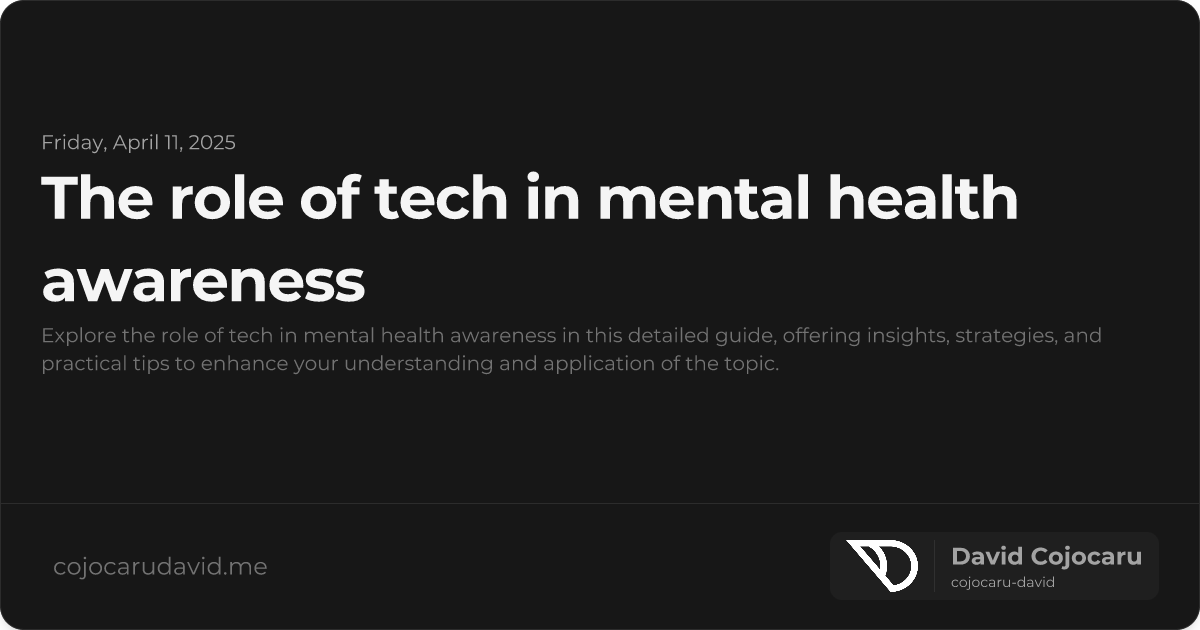Bridging the Gap: How Technology is Revolutionizing Mental Health Awareness
Mental health awareness is rightfully taking center stage globally. Technology is emerging as a powerful force, helping to dismantle stigmas and provide crucial support systems. From innovative apps offering personalized mental wellness strategies to data-driven research unlocking new understandings of the human mind, technology is transforming how we approach and address psychological well-being. This post delves into the groundbreaking ways technology is shaping mental health advocacy, accessibility, and treatment.
Enhancing Mental Health Awareness Through Technology
1. Mental Health Apps and Digital Therapy: Support in Your Pocket
Mobile applications have revolutionized self-care, putting a wealth of resources at your fingertips. These apps offer tools for mindfulness, stress management, and even therapy, all accessible from the convenience of your smartphone. Consider these examples:
- Guided Meditation: Apps like Headspace and Calm provide structured meditation exercises to reduce stress and improve focus.
- AI-Powered Chatbots: Woebot and similar apps offer instant emotional support and guidance through conversational AI.
- Mood Trackers: These tools allow you to monitor your emotional patterns, helping you identify triggers and track your progress over time.
These apps democratize access to mental health resources, making them available anytime, anywhere, breaking down geographical and financial barriers.
2. Wearable Tech: Monitoring and Managing Emotional Well-being
Smartwatches and fitness trackers are evolving beyond simple activity tracking. They now incorporate features that monitor key indicators of mental health, such as stress levels, sleep quality, and heart rate variability.
- Heart Health Monitoring: The Apple Watch, for instance, can detect irregular heart rhythms, potentially linked to anxiety and stress.
- Guided Breathing Exercises: Fitbit offers guided breathing exercises directly on your wrist, providing a convenient way to reduce stress and promote relaxation.
By providing real-time feedback on physiological indicators, these devices empower users to take proactive steps towards emotional balance.
3. Social Media and Online Communities: Finding Connection and Support
Social media platforms like Instagram, Reddit, and dedicated online forums are fostering vibrant mental health discussions and reducing feelings of isolation.
- Supportive Communities: Hashtags such as #MentalHealthMatters and #EndTheStigma create spaces for people to share their experiences, offer support, and connect with others who understand.
- Shared Experiences: These platforms provide a sense of community, allowing individuals to realize they are not alone in their struggles and learn coping strategies from others.
AI and Machine Learning: The Future of Personalized Mental Healthcare
Predictive Analytics: Identifying and Preventing Crises
AI and machine learning are revolutionizing mental healthcare by providing powerful tools for early intervention and personalized treatment.
- Suicide Risk Detection: AI algorithms can analyze language patterns in social media posts to identify individuals at risk of suicide, enabling timely intervention.
- Depression Screening: Voice tone recognition technology in telehealth calls can screen for signs of depression, facilitating early diagnosis and treatment.
Virtual Reality (VR) Therapy: Immersive and Effective Treatment
VR is emerging as a powerful tool for treating a range of mental health conditions, including PTSD, phobias, and anxiety disorders. By simulating controlled exposure therapy environments, patients can confront their fears in a safe, virtual space.
Challenges and Ethical Considerations: Navigating the Digital Landscape
While technology offers immense benefits, it’s crucial to address the challenges and ethical considerations associated with its use in mental health.
- Data Privacy: Ensuring the security and confidentiality of sensitive mental health data is paramount. Robust data protection measures are essential.
- Complement, Not Replace: Digital tools should complement, not replace, traditional professional care. They are a valuable resource, but not a substitute for qualified therapists and counselors.
- Accessibility: Bridging the digital divide and ensuring equitable access to technology is crucial. Not everyone has the resources or technical skills to fully utilize these tools.
The Future of Tech in Mental Health: A Glimpse into Tomorrow
The integration of technology into mental health care is poised to deepen, with emerging trends promising even more personalized and widespread support.
- Blockchain Security: Blockchain technology can provide secure and tamper-proof storage of therapy records, enhancing patient privacy and data integrity.
- AI-Driven Personalization: AI can analyze individual data to create personalized therapy plans, tailoring treatment to specific needs and preferences.
- Gamification: Gamified mental health exercises can make self-care more engaging and motivating, encouraging consistent use and positive outcomes.
“Technology offers a powerful opportunity to reach those who suffer in silence, providing a lifeline and a path towards well-being.”
Conclusion: Embracing Innovation for a Brighter Future
Technology’s role in mental health awareness is undeniable. It democratizes access to care, fosters global conversations, and empowers individuals to take control of their well-being. While challenges remain, the potential for innovation in this space is limitless. By embracing these advancements thoughtfully and ethically, we can create a future where mental health support is readily available, personalized, and effective, just a click away.

